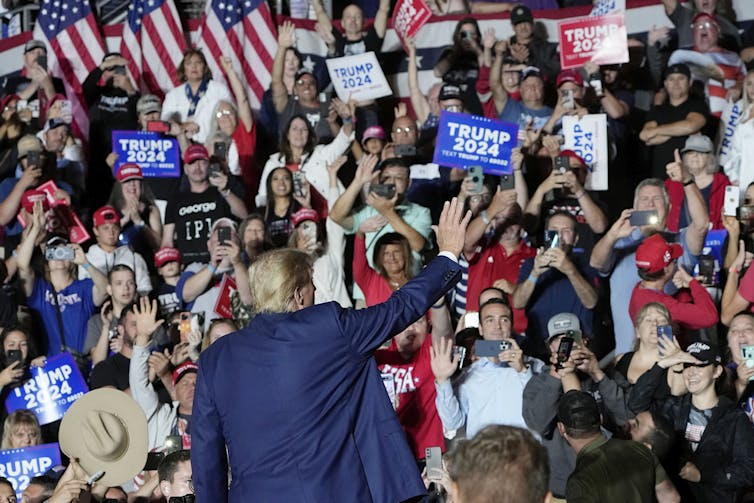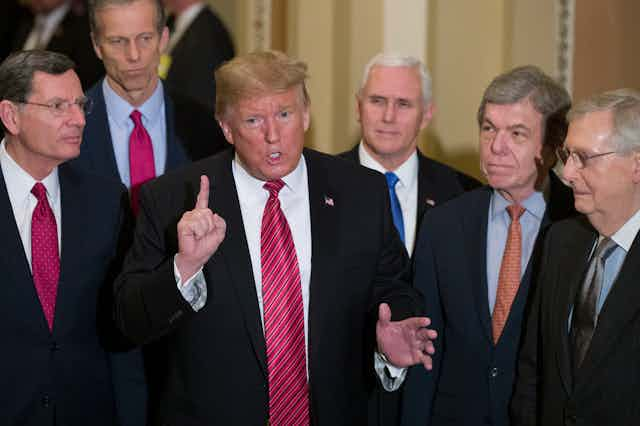As former President Donald Trump edges closer to clinching the Republican presidential nomination in 2024, our political science research has shown that a second Trump presidency is likely to damage American democracy even more than his first term did. The reason has less to do with Trump and his ambitions than with how power dynamics have shifted within the Republican Party.
In our forthcoming book, “The Origins of Elected Strongmen: How Personalist Parties Destroy Democracy from Within,” we explain the dangers that arise when leaders come to power backed by political parties that exist primarily to promote the leader’s personal agenda, as opposed to advancing particular policies.
In general, typical political parties select new leaders at regular intervals, which gives elites in the party another chance to win a nomination in the future if the party is popular. And typical parties tend to select leaders who rise up the ranks of the party, having worked with other party elites along the way.
But so-called personalist parties, as political scientists like us call them, are a threat to democracy because they lack the incentives and ability to resist their leader’s efforts to amass more power.
From 1990 to 2020, in countries all over the world, elected leaders backed by personalist parties have gone on to undermine democracy from within. There are three reasons personalist parties are harmful to democracy, all of which have clear parallels to experiences with Trump and the Republican Party.
1. Loyalty to the person, not the party
Personalist party elites are loyal to the leader. A classic indicator of party personalization is the ouster of politically experienced people in the party elite, who are often highly qualified and more independent of the leader – and their replacement with less experienced people who are personally loyal to the leader. These people are more likely to view their political success as being intertwined with that of the leader rather than the party. They therefore are more likely to support the leader’s agenda, no matter how harmful it may be for democracy.
In Turkey, for example, Recep Tayyip Erdogan’s Justice and Development Party, known in Turkish as the AKP, initially included elites who were established politicians, such as Ali Babacan, Abdullah Gul and Bulent Arinc. As time passed, however, Erdogan weeded out these veterans and replaced them with more loyal supporters. This paved the way for Erdogan to consolidate control, including – among other things – shifting power in 2018 from the parliament to the presidency and expanding his powers considerably.
2. Official endorsement of leader’s actions
In personalist parties, elites endorse the leader’s actions, cueing voters to do the same. Ordinary citizens who support personalist parties often go along with leaders’ efforts to dismantle democracy, even if they care about democracy, because they are highly receptive to signals provided by the party elite. When the party higher-ups endorse – rather than condemn – the leader’s undemocratic inclinations, supporters get the message that nothing is wrong, and they fall in line.
In Brazil, for example, then-President Jair Bolsonaro generated doubts among supporters that the 2022 presidential elections would be fair, suggesting that electoral officials might manipulate the results in his opponent’s favor. The political elite, including members of Brazil’s Congress, amplified these claims.
These elite cues signaled to Bolsonaro supporters that his actions were compatible with a healthy democracy, ultimately setting the stage for them to resort to violence when Bolsonaro lost the election in a contest that independent observers considered free and fair.
3. Polarizing society with controversy
Leaders of personalist parties polarize the societies they govern.
While many kinds of leaders demonize their political opponents, we have found that personalist party leaders’ anti-democratic behaviors – such as attempting to overturn an election they’ve lost – split society into polarized factions: those who support them and everyone else.
When opponents of the leader raise concerns that the leader’s actions are harmful to democracy, as the Democrats regularly have since Trump won office in 2016, supporters dig in their heels in defiance, incredulous that there is cause for concern. Affective polarization, where citizens increasingly dislike their opponents, deepens. With the opponents vilified, the leader has the political support to take actions to keep the other side out of power, even if those actions undermine democracy in the process.
Take Venezuela, historically one of the most stable democracies in Latin America. Former President Hugo Chavez’s power grabs splintered Venezuelan society, dividing citizens over what the rules of the game should be and who should have access to power. As the chasm between his backers and the opposition grew, so did the abuses of power his supporters were willing to accept to ensure his continued rule. Chavez’s actions, which faced no resistance from those in his party, polarized society, ultimately pushing the country toward dictatorship.

The GOP is a personalist party
The present Republican Party closely fits the personalist mold.
Conventionally, a party leader rises through the party ranks. But Trump didn’t do that, and before seeking the presidency, he didn’t have strong, collegial relationships with key Republican figures in government. Rather, he switched party allegiance several times and before becoming president had never held any elected office.
Since 2016, Trump has increasingly sidelined the traditional party establishment to remake the party into an instrument to further his own personal, political and financial interests. As an indicator of this, the party elite have grown fearful of diverging from his agenda, so much so that the 2020 GOP platform essentially amounted to “whatever Trump wants.” Today, the main qualification for a Republican candidate or appointee appears to be loyalty to Trump himself, not fealty to longstanding GOP principles. Traditional parties, including the pre-Trump Republican Party, offer voters a bundle of policy positions hashed out among multiple elite factions of the party.
Trump’s supersized control over the Republican Party has transformed other leading party figures into sycophants, always seeking Trump’s favor. Even Florida Gov. Ron DeSantis, after experiencing ridicule and abuse from Trump, endorsed the former president’s bid to return to the White House.
No resistance to a Trump power grab
The personalist nature of the Republican Party means that if Trump were to win office again, he is unlikely to face pushback from the party on any issue. All signs indicate that Trump, if reelected, is likely to pursue an authoritarian power grab by, for example, purging professional bureaucrats, expanding the Supreme Court or using the Insurrection Act to deploy the military against protesters. Party members may even support him in that power grab.
Most elected leaders are ambitious and, like Trump, seek to gain and hold onto power for as long as they can. Indeed, very few elected leaders resign voluntarily. The octogenarians who fill Congress attest to many politicians’ unwillingness to relinquish the power they have.
We have found that what matters for democracy is not so much the ambitions of power-hungry leaders, but rather whether those in their support group will tame them.
As our research shows, the most danger comes when personalist ruling parties hold legislative majorities and the presidency, meaning opposition parties in the legislature can’t stop the ruling party from dominating. In those circumstances, there is little that stands in the way of a grab for power. For instance, if Republicans won a slim Senate majority, they might abolish the filibuster. That would limit Democrats’ ability to hold up legislation they opposed.
Elected leaders backed by personalist parties are therefore often successful in dismantling institutional checks on their power, whether from the legislature or the courts. Leaders of personalist parties have attempted to curb judicial constraints in countries as different as El Salvador, Hungary and Israel, with the ruling parties doing little to stop their efforts.
Long-standing and wealthy democracies, like the U.S., are remarkably resilient to the challenges that confront them. But ruling party personalism helps elected leaders undercut these protective guardrails. Because the Republican Party has taken a personalist turn under Trump’s spell, democracy in the U.S. would suffer should Trump win a second term.

